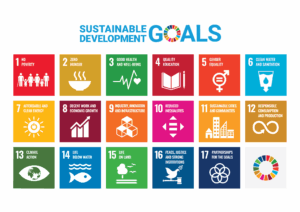United Nations Sustainable Development Goals: A World of Opportunity in Data for Good
David Corliss is the AVP technical expert in data science at General Motors OnStar Insurance. He also serves on the steering committee for the Conference on Statistical Practice and is the founder of Peace-Work.
Each year in April, this column celebrates Earth Day by looking at opportunities for environmental advocacy using statistics and data science. Many of these relate to the United Nations’ sustainable development goals (SDGs). However, these goals include much more than the environment. This month, Stats4Good looks at all 17 SDGs, projects, and resources and how to get involved.
August is the month for following up on the Joint Statistical Meetings—and this is for everyone, not just those who were able to attend! Use the conference program search engine to find information about the projects that interest you most and reach out to authors, panel participants, and course instructors to start planning your next project in Data for Good.
Developed in 2015 as part of a broad UN initiative to set long-term goals, the scope of the SDGs is wide. The UN’s call to action states the objective to create a “shared blueprint for peace and prosperity for people and the planet, now and into the future.” That makes the SDGs much more than development in the traditional sense of the word. They’re a pathway and set of resources for all countries—not only developing nations—to create a better, more peaceful, and more sustainable world. As is so often the case in Data for Good, there is a lot of data available and far too few people to do the analysis needed to strengthen the impact.
The UN’s website includes information about SDGs as a whole and a page for each goal. Each page describes the individual goal in detail and provides links to actions, events, and resources supporting it. While all 17 goals are interrelated, they can be placed into groups such as initiatives for human well-being, which includes the no poverty, zero hunger, quality education, and good health and well-being goals.

United Nations Sustainable Development Goals. Reprinted with permission from the United Nations.
One important area of research right now is the impact of the pandemic on the poorest communities. While efforts to reduce poverty and related issues have made progress in recent decades, the pandemic caused serious setbacks. It’s a good example of how the SDGs address issues affecting all countries, including the US, where the percentage of people below the official poverty line rose from 10.4 percent to 11.7 percent due to the pandemic. The many dimensions of poverty are often neglected problems, underscoring the need for statistical volunteers to get involved.
Another area addressed by the SDGs is environmental advocacy, including goals for climate action—one of the Stats4Good top initiatives for 2023—life below water, life on land, and responsible production and consumption. This is one of the most intersectional areas of the SDGs. For example, 90 percent of people in the global fishing industry work in small and fragile fisheries. That means healthy oceans make for healthy communities, reducing poverty on a global scale.
It’s also a topic that can get community leaders to respond: Legislators and others who show little interest in protecting the environment will start listening when the subject becomes sustainable jobs.
Statisticians and data scientists are needed to frame economic arguments for environmental advocacy that have the power to persuade those not already on board.
While economic interests are often seen as contrary to environmental needs, this thinking is a case of the tragedy of the commons, where everyone loses. Accordingly, the SDGs for industry and human activity focus on developing a sustainable economy. The goals include affordable clean energy; decent work and economic growth; and industry, innovation, and infrastructure. Statistical science is playing a leading role in developing the economy of the future that really has a future!
The UN has also established SDGs in justice and human rights, including reduced inequalities; gender equality; and peace, justice, and strong institutions. This road map for a sustainable world necessarily involves developing a more just and equitable world for all. Statistical volunteers can make a big impact.
Important areas at this time include the plight of migrants and the record high number of refugees. The pandemic and increasing poverty have affected many long-standing issues. The Russia-Ukraine war is another area in which scientific study is needed. The UN Global Migration Database provides the data needed to support investigation into the impact of the Russia-Ukraine war and other conflicts around the world.
The United Nations SDGs provide direction, resources, and networks needed to address a host of important issues. Every goal and initiative needs statistical support. Statistics is the science all other sciences use, underscoring the need for local studios, student projects, and statistical support for grant proposals. The UN’s SDGs offer a world of opportunity, and each of us can play an important role.
Editor’s Note: The content of this publication has not been approved by the United Nations and does not reflect the views of the United Nations or its officials or member states.


















Leave your response!